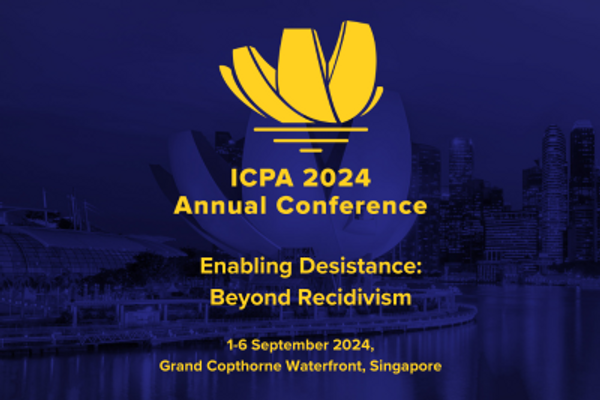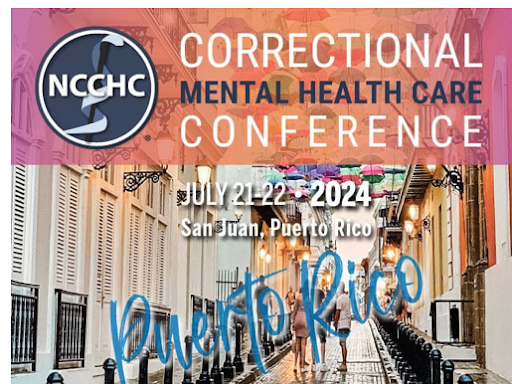
We've compiled top highlights from recent research, policy, and practice resources across the world for our latest IACFP International News summary. Our topics for January and February, 2024 include recent research; policy updates; considerations for practice; and upcoming conferences.
1. IACFP Updates
-
The IACFP Board has appointed Dr. Kristy Holtfreter to serve a three-year term as editor-in-chief of Criminal Justice and Behavior, beginning January 1, 2024.
 Dr. Holtfreter has previously contributed to CJB as an Associate Editor, Editorial Board Member, Special Issue Guest Editor (January 2016), author, and active reader of published content. She is the sixth individual–and the second woman–to have earned the role of Editor-in-Chief. Her stated goals during her term are to focus on internationalization, diversity and inclusion, integrity, and impact.
Dr. Holtfreter has previously contributed to CJB as an Associate Editor, Editorial Board Member, Special Issue Guest Editor (January 2016), author, and active reader of published content. She is the sixth individual–and the second woman–to have earned the role of Editor-in-Chief. Her stated goals during her term are to focus on internationalization, diversity and inclusion, integrity, and impact.
Dr. Holtfreter received her Ph.D. in Criminal Justice from Michigan State University with a focus on industrial and organizational psychology and behavior. At Arizona State University, she currently holds the faculty positions of Professor in the School of Criminology and Criminal Justice; Fellow in the Center for Innovation in Health and Resilient Aging; and Faculty Affiliate in the Office of Gender-Based Violence. As CJB celebrates its 50th anniversary of publication this year, Dr. Holtfreter views this milestone as “...an ideal time to reflect on the journal’s accomplishments and outline a path forward that will ensure continued quality and solidify its position as a leading publication in correctional psychology."
Dr. Holtfreter is joined by Managing Editor Dr. Raven Simonds and Associate Editor Dr. Andrea Montes. Associate Editors who continue to serve on the editorial team are Ashley Batastini, Jennifer Eno Louden, Chantal Fahmy, and Joseph Schafer. Natalie Anumba will continue to serve as Book Editor. Please join us in welcoming the new editorial team and in wishing them a successful tenure at CJB!
2. Research
-
Criminological Highlights
The December 2023 issue of Criminological Highlights, Vol. 21, Number 2, is available here. It is published by the Centre for Criminological and Sociolegal Studies at the University of Toronto.
This issue of Criminological Highlights addresses the following questions:
- How did American news organizations contribute to American mass incarceration?
- How do many police departments see their relationships to ordinary citizens?
- Should communities welcome the implementation of “school resource officers” [police attached to ordinary schools]?
- Is the impact of school suspensions the same across racialized groups of students?
- How do ordinary political affiliations affect ordinary policing?
- Why do so many people who don’t have stable housing have criminal records?
- Are laws prohibiting employers from asking about the criminal records of job applicants effective in helping this group get jobs?
- Why is it important, when attempting to control incarceration rates, to look beyond the laws related to sentencing and imprisonment?
-
British Psychological Society Publishes Report on NHS Staff Mental Health and Wellbeing Hubs
The BPS report Learning from the NHS Staff Mental Health and Wellbeing Hubs, accessible from this link, was published in December 2023. BPS hopes the report will “help inform and shape future services supporting the health and care workforce.”
Since 2021, the NHS has set up and implemented Staff Health and Wellbeing Hubs in England. The hubs began with significant investment and a period of innovation. However, government funds for these hubs were ended in March 2023, and the implementation and outcomes from the hubs are now being reviewed to offer insights for learning. The BPS states that “…it’s vital that learning from the hubs is not lost but can contribute to the future development of accessible, evidence-based mental health and wellbeing offers for health and care staff.” Everyone working and leading in corrections can benefit from this learning.
The report offers eight principles for supporting staff mental health. These principles are:
- System-wide Ownership
- Positive System-wide Engagement
- Independent and Confidential
- Psychologically Informed Expert Services
- Psychologically Safe, Inclusive, and Accessible
- Consistent, Persistent Promotion and Outreach
- Consistent, Persistent Promotion and Outreach
- Long Term Sustainable Investment
This report and its recommendations can serve as a foundation for any system seeking to develop or enhance staff wellbeing services and supports. As noted in another report from the NHS published on January 30, 2024, “…spending on temporary staff highlights the need for an investment into staff wellbeing services.” Staff wellbeing is a critical component of staff recruitment and retention, a global issue in corrections as well as correctional psychology and rehabilitation services.
-
Prison Officers: International Perspectives on Prison Work
This book, edited by Helen Arnold, Matthew Maycock, and Rosemary Ricciardelli, was recently published by Springer. It is part of the Palgrave Studies in Prisons and Penology, a unique series dedicated to prison scholarship. The book provides contemporary and diverse perspectives on the role that correctional/prison offers play within correctional systems throughout the world. Chapters explore topics such as:
- Power and authority
- Identities and workplace culture
- Prison policy and management
- Working conditions and prison officer wellbeing
Individual chapters look at the realities of prison work in Australia, Brazil, Canada, England, France, Ghana, Hong Kong, India, Myanmar, Norway, post-Soviet Russia, Scotland, Sweden, Uganda, Ukraine, and the United States. It presents perspectives from the public, prison officers, prison leadership, and justice-involved individuals. This book provides a great collection of research focused on the realities of prison work and offers a foundation for a future of improved practice and outcomes.
Information on purchasing this hardcover or eBook is available here.
3. Policy and Practice
-
The Forensic Psychology Podcast
Two recent episodes of The Forensic Psychology Podcast will be of interest to readers of the IACFP Bulletin. The first is “Bias in Forensic Psychology: Live at the European Congress of Psychology, Brighton 2023.” In this first-ever live recording for their podcast, co-hosts Sally Tilt and Dr. Kerensa Hocken from the HM Prison and Probation Service Psychology team—who have 40 years of experience as forensic psychologists between them—interview a panel consisting of clinical and forensic psychologists Martine Ratcliffe, Dr. Tansy Warrilow, and Lawrence Jones. The focus of the discussion is bias, particularly in assessment and treatment. They explore what biases exist outside our frameworks and what to do about it, and also take questions from the audience.
The second episode is “Brain Injuries: Prof Huw Williams Live at HMPPS National Psychology Conference 2023”. In this episode, Sally Tilt and Dr. Kerensa Hocken interview Exeter University Professor of Clinical Neuropsychology Huw Williams, who has pioneered research focusing on traumatic brain injury (TBI) in those involved in the criminal justice system and other research into neuro-rehabilitation and crime. He and his colleagues have shown that a substantial number of people in contact with the law have experienced TBI, and their findings have influenced screening and assessment for TBI both nationally and internationally, contributing to changes in the UN Convention on Rights of the Child that enable better support for those with neurodisability to lessen risk of criminalization.
Several members of the IACFP Board listened to the podcast with Prof Williams and offered the following perspectives on it:
- “Practical, relevant, and chock full of interesting information”
- “Absolutely excellent; the best 45 minutes I’ve spent in quite a while”
- “Interesting and informative”
- “[Describes how] practical diagnostic, rehabilitative and social ideological challenges within our systems have hampered progress guiding mental health services”
- “[TBI is] often left unidentified and underdiagnosed”
- “Great foundation particularly for those who are early to mid-career practitioners”
Prof. Williams is an engaging speaker. This podcast episode is highly recommended!
-
Violence Reduction in Scotland
The Scottish Centre for Crime and Justice Research recently released the study Safe Space: The Past and Present of Violence Reduction in Scotland. This new report, available here, was co-authored by Prof. Alistair Fraser, Dr. Keir Irwin-Rogers, Dr. Fern Gillon, Prof. Susan McVie OBE FRSE, and Dr. Tilman Schwarze.
The report focuses on Scotland’s public health approach to violence reduction through investment in violence reduction units (VRUs). As stated on the SCCJR website:
“The research findings identified key lessons that can be learned from the Scottish experience including early intervention and a shared commitment to the value of listening to, and taking seriously, professional and lived experience in the areas of violence and violence prevention.
The report concludes by stating that while there are substantial benefits both in Scotland and beyond for approaching issues of crime and justice through a public health lens, close attention should be paid by other VRU’s on what their local context and need is.”
4. Upcoming Conferences
- Call for Papers: ICPA ANNUAL CONFERENCE 2024
Submit your abstract before Sunday March 23, 2024!
Across the world, corrections agencies, academics, and corrections-involved organisations are embracing philosophies of desistance. For decades, psychological approaches have formed the basis of correctional programming, in which the goals of changing thoughts and attitudes and “fixing” people who have offended have been given more attention than addressing the social, contextual, and structural barriers that exist upon release. The people we manage in custody and the community require support to develop the capacities and motivation to live differently and the opportunities to find resources to sustain a different life. The complex and interrelated factors that impact an individual’s journey to desistance necessitates deep investigation and consideration.
For its 2024 Annual Conference in Singapore, the International Corrections and Prisons Association (ICPA) invites individuals, agencies, and organisations to submit proposals, focusing on the theme of Enabling Desistance: Beyond Recidivism. Through this theme, we will explore the factors throughout the criminal justice, prison, and post-release landscapes that impact upon achieving long-term desistance.
We welcome submissions from practitioners, academics, researchers, justice officials, international organizations, and others engaged in correctional services who are contributing to the future directions of corrections. Please note that private and not-for-profit organisations are strongly encouraged to consider co-presenting with public sector partners where appropriate.
- 6th World Congress on Probation adn Parole, April 16-18, 2024
The Netherlands will host the 6th World Congress on Probation and Parole in The Hague. Reclassering NL invite interested parties to a varied and inspiring congress on the theme 'The future of probation and parole': how do we see and utilize probation and parole in different settings and developments? What can we learn from the past? And what can we learn from each other? More information can be found here.
- Technology in Corrections (TIC), April 21-24, 2024
More information can be found at here.
- Spring Conference on Correctional Health Care, April 27-30, 2024
More information available here.
Schedule of Events
Saturday, April 27 – Preconference seminars
Sunday, April 28 – Preconference seminars, CCHP exams, Exhibit hall opening reception
Monday-Tuesday, April 29-30 – Conference Sessions, Exhibit Hall
Whether you’re new to the field or a correctional health care veteran, you’ll find valuable connections, inspiration and ideas! The Spring Conference delivers unparalleled education and professional development opportunities for: administrators, counselors, custody staff, dentists, legal professionals, nurses, nurse practitioners, PAs, pharmacists, physicians, psychiatrists, psychologists, social workers, and all other correctional health professionals.
More information on this event can be found here.
- Correctional Mental Health Care Conference, July 21, 2024
Two days of information laser-focused on correctional mental health care issues: juvenile, substance abuse, suicide prevention, trauma, self-care, and more…plus the opportunity to take the CCHP and specialty exams on-site.
More information on this event can be found here.







